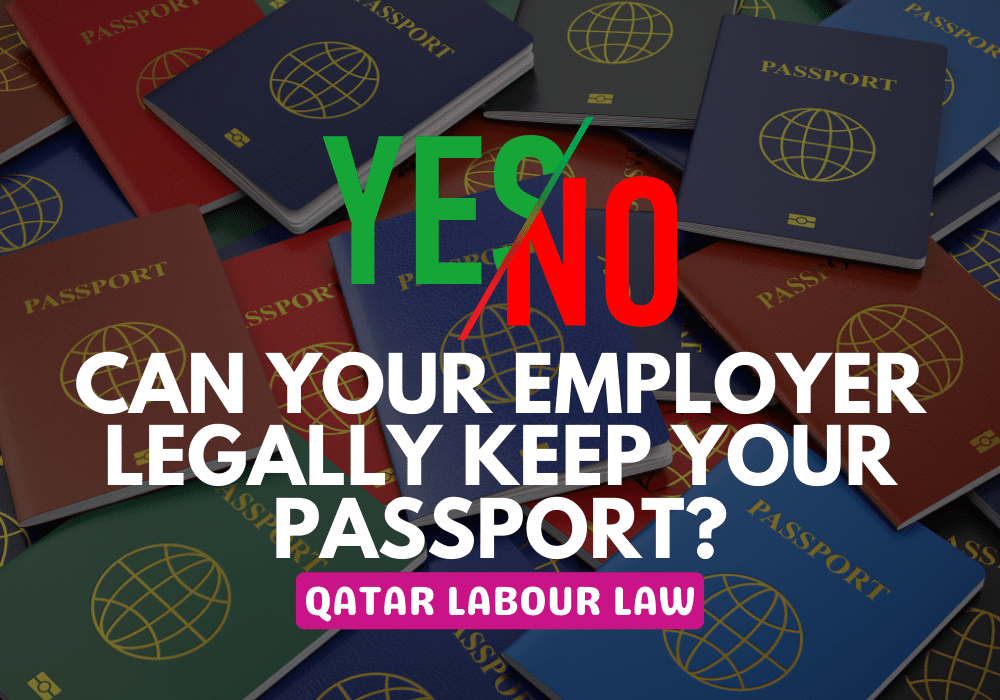Understanding the Legalities of Passport Retention by Employers in Qatar
In an era of global mobility, the issue of employers retaining employees’ passports has become a contentious subject, particularly in regions with a high expatriate population like Qatar. This practice often raises concerns regarding legality and the fundamental rights of workers. The State of Qatar, in alignment with international labor laws, has specific regulations addressing this issue.
Qatari Laws on Passport Retention
According to Qatari law, it is illegal for employers to retain the passports of their employees. The Qatar Labour Law explicitly states that an employer must return an employee’s passport after completing necessary residency procedures, such as visa and work permit processing. This regulation aims to protect workers’ rights and ensure their freedom of movement.
The Role of the Kafala (Sponsorship) System
The Kafala system in Qatar granted employers significant control over their foreign employees’ mobility, including the preservation of their passports. Originally, this system was designed to regulate the immigration and residency of foreign workers by assigning responsibility to local sponsors. However, extensive criticisms and demands for reform, especially in light of the FIFA World Cup 2022 preparations, led to significant changes in 2020. These reforms are aim to to improve labor laws and protecting expatriate workers’ rights. This includes abolishing the requirement for exit permits and reducing the control employers had over employees’ travel and residency documents.
Recent Legal Reforms and Impact
Law No. 19 of 2020 introduced a significant reform, dismantling numerous restrictive aspects of the Kafala system, thereby empowering employers. This new law enhances labor mobility and explicitly allows employees to change jobs without obtaining an NOC (No Objection Certificate) from their current employer. Law No. 16 of 2022 has introduced more stringent penalties for passport retention, thereby strengthening the prohibition against this practice.

Employee Rights
Freedom of Movement:
Employees have the right to keep their passports and travel freely. Retaining a passport restricts an employee’s ability to leave the country or change employers.
Legal Recourse:
If an employer unlawfully retains a passport, employees can file a complaint with the Ministry of Administrative Development, Labour and Social Affairs (MADLSA).
Protection Against Exploitation:
The prohibition on retaining passports helps prevent situations where employees might feel trapped or exploited by their employers.
Read: Salary Transfers with WPS (Wage Protection System) in Qatar
Employer Responsibilities
Compliance with the Law:
Employers must comply with the legal requirement to return passports after processing residency permits and other necessary documentation.
Providing Security:
Some employers argue that holding passports provides security for company assets and investments. However, this practice is not legally justified and should be addressed through other lawful means.
Alternative Solutions:
Employers concerned about potential absconding of employees should explore alternative solutions, such as implementing clear contract terms and offering competitive working conditions.
Read: How to Verify Your Labor Contract Online in Qatar (2024)

Steps to Take if Your Passport is Retained
Request Return:
Politely request your employer to return your passport, citing the legal provisions that prohibit passport retention.
Seek Mediation:
If the employer refuses, seek mediation from the company’s HR department or labor relations office.
File a Complaint:
As a last resort, file a complaint with MADLSA. The ministry can intervene and ensure compliance with the law.
Conclusion
Although the practice of employers retaining employees’ passports was once a common occurrence in Qatar, legal strides have been made to eradicate this practice and empower workers. The current laws clearly stipulate that this practice is illegal, providing workers with avenues for redress and further protection under Qatari law. As reforms continue to evolve and expand, it is vital for both employers and employees to remain informed about the legal landscape in Qatar regarding employment and residency rights.






